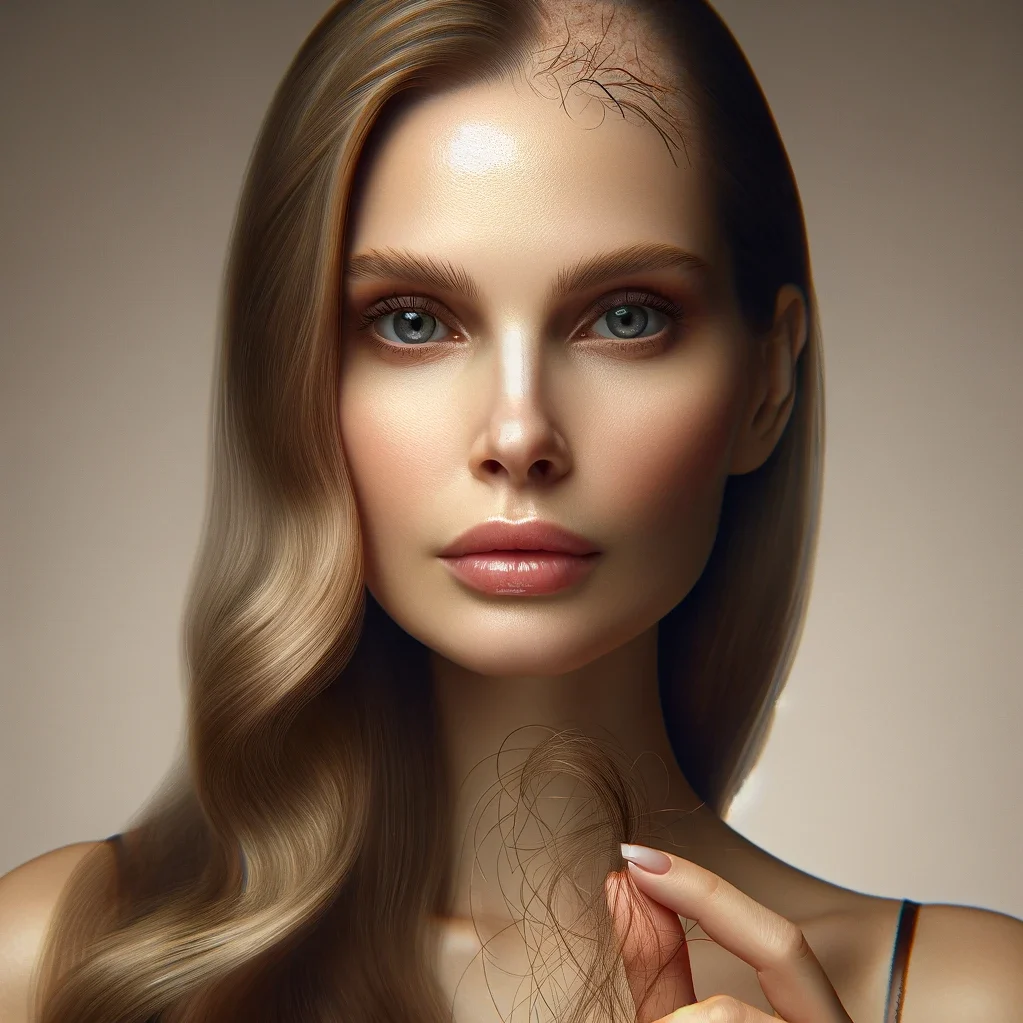Female hair thinning can be a distressing concern for many women. Whether it’s caused by genetic factors, hormonal imbalances, or lifestyle choices, finding effective remedies is essential to restore volume and confidence. In this article, we will explore various remedies, including natural solutions, that can help combat hair thinning in females.
Key Takeaways:
- Female hair thinning is typically caused by genetic predisposition and hormonal factors.
- Treatment options for female hair thinning include oral antiandrogen therapies, topical minoxidil, and natural remedies.
- Scalp massage, DHT-blocking scalp serums, and dietary supplements can promote hair regrowth.
- Consult with a healthcare professional for accurate diagnosis and personalized treatment plans.
- Results may vary, and patience is key when implementing hair loss remedies.
Understanding Different Types of Hair Loss in Women
Hair loss in women can manifest in different types, each requiring specific treatment approaches. It is important to understand the underlying cause of hair loss to develop an effective treatment plan. Let’s explore the various types of hair loss and the recommended remedies.
1. Androgenetic Alopecia (Female Pattern Hair Loss)
Androgenetic alopecia, also known as female pattern hair loss, is the most common type of hair loss in women. It is characterized by a gradual thinning of hair on the top of the head and the temples. Treatment options for female pattern hair loss may include:
- Topical minoxidil: This medication stimulates hair growth and reduces hair loss.
- DHT-blocking scalp supplements and serums: These products counteract the effects of dihydrotestosterone on hair follicles.
- Scalp massage: Massage can improve blood circulation to the scalp, promoting hair growth.
- Lifestyle modifications: Maintaining a balanced diet, managing stress, and avoiding harsh styling practices can help prevent further hair thinning.
2. Telogen Effluvium (Sudden Hair Shedding)
Telogen effluvium is a type of hair loss characterized by sudden and excessive hair shedding. It is often triggered by physical or emotional stress, hormonal changes, medications, or nutritional deficiencies. Treatment options for telogen effluvium may include:
- Resolving the underlying cause: Identifying and addressing the underlying cause of hair shedding is crucial for hair regrowth.
- Ensuring a balanced diet: Adequate nutrition, including essential vitamins and minerals, promotes healthy hair growth.
- Reducing stress: Stress management techniques, such as meditation or therapy, can help mitigate hair loss.
3. Traction Alopecia (Hair Loss Due to Tight Hairstyles)
Traction alopecia occurs when tight hairstyles, such as braids, ponytails, or extensions, pull on the hair and lead to hair loss. The best approach to treating traction alopecia is to avoid hairstyles that put excessive strain on the hair follicles. Additionally, using gentle hair care practices and giving the hair regular breaks from styling can promote regrowth.
4. Alopecia Areata (Autoimmune Hair Loss)
Alopecia areata is an autoimmune condition that causes patchy hair loss. Treatment options for alopecia areata may include:
- Topical corticosteroids: These medications can reduce inflammation and promote hair regrowth.
- Immunosuppressive drugs: In severe cases, medications that suppress the immune system may be prescribed.
- Supportive care: Wigs or other hair coverings can help individuals cope with the emotional impact of hair loss.
5. Tinea Capitis (Fungal Infection)
Tinea capitis is a fungal infection of the scalp that can cause hair loss. Antifungal medications are typically prescribed to treat this type of hair loss. It is essential to consult with a dermatologist or qualified healthcare professional for accurate diagnosis and appropriate treatment.
Understanding the different types of hair loss in women is the first step towards finding effective remedies. By partnering with healthcare professionals, women can develop personalized treatment plans to address their specific hair loss concerns.

Hair Loss Types and Recommended Treatments
| Hair Loss Type | Recommended Treatments |
|---|---|
| Androgenetic Alopecia (Female Pattern Hair Loss) | Topical minoxidil, DHT-blocking scalp supplements and serums, scalp massage, lifestyle modifications |
| Telogen Effluvium (Sudden Hair Shedding) | Address underlying cause, balanced diet, stress reduction |
| Traction Alopecia (Hair Loss Due to Tight Hairstyles) | Avoid tight hairstyles, gentle hair care practices, regular breaks from styling |
| Alopecia Areata (Autoimmune Hair Loss) | Topical corticosteroids, immunosuppressive drugs, supportive care |
| Tinea Capitis (Fungal Infection) | Antifungal medications prescribed by a healthcare professional |
Effective Treatments for Female Hair Loss
Find Holistic Approaches to Combat Female Hair Thinning
At [Brand Name], we understand the distress caused by hair thinning in females. We are dedicated to providing effective solutions for thinning hair and empowering women to regain their confidence. Our holistic approach to female hair loss encompasses various treatment options that target the root causes of thinning hair. Through a combination of targeted therapies and lifestyle modifications, we aim to help women achieve healthier and fuller hair.
The Power of Minoxidil: Stimulate Hair Growth and Reduce Hair Loss
One of the most effective treatments for female hair loss is the use of minoxidil. This topical medication stimulates hair growth and reduces hair loss by revitalizing dormant hair follicles. When applied regularly to the scalp, minoxidil works to improve blood circulation and deliver essential nutrients to the hair follicles, promoting healthy hair growth.
By incorporating minoxidil into your daily hair care routine, you can take proactive steps to prevent further hair thinning and achieve thicker, fuller hair. It is important to note that individual responses may vary, and consistent use of minoxidil is key to seeing significant results.
Combat Dihydrotestosterone (DHT) with DHT-Blocking Scalp Supplements

Another effective solution for female hair thinning is the use of DHT-blocking scalp supplements. Dihydrotestosterone (DHT) is a hormone that plays a role in hair follicle miniaturization and contributes to hair loss. By incorporating DHT-blocking supplements into your hair care routine, you can counteract the effects of DHT and promote healthier hair growth.
Our DHT-blocking scalp supplements are specially formulated with natural ingredients that work synergistically to inhibit the conversion of testosterone into DHT. These supplements not only foster hair regrowth but also help maintain the overall health of your scalp, ensuring a conducive environment for hair growth.
Scalp Massage: Enhance Scalp Health and Promote Hair Growth
One simple yet effective holistic approach to combating female hair thinning is scalp massage. Regular scalp massages help improve blood circulation, reduce stress, and stimulate the hair follicles, promoting hair growth.
Using gentle circular motions, massage your scalp for a few minutes each day. You can enhance the effectiveness of scalp massage by using nourishing oils or serums that nourish the hair follicles and promote a healthy scalp environment. By making scalp massage a part of your hair care routine, you can enhance scalp health and encourage the growth of thicker, fuller hair.
Lifestyle Modifications: Prevent Hair Thinning in Females
While professional treatments and targeted therapies are essential, incorporating lifestyle modifications into your daily routine can also make a significant difference in preventing hair thinning. Here are some female hair thinning prevention tips:
- Manage stress: Chronic stress can contribute to hair loss. Implement stress management techniques such as meditation, yoga, or deep breathing exercises.
- Maintain a balanced diet: Ensure that your diet includes essential nutrients for hair growth, such as vitamins A, C, E, and biotin. Incorporate foods rich in proteins, fruits, vegetables, and whole grains into your meals.
- Avoid harsh styling practices: Excessive heat, chemical treatments, and tight hairstyles can damage the hair follicles, leading to hair thinning. Minimize the use of heat styling tools, opt for gentle hair accessories, and avoid hairstyles that pull on the hair.
By following these lifestyle modifications, you can create an optimal environment for healthy hair growth and reduce the risk of hair thinning in females.
“At [Brand Name], we believe in a comprehensive approach to female hair loss that combines effective treatment strategies with self-care practices. By addressing the underlying causes of hair thinning and promoting scalp health, we aim to help every woman achieve beautiful, voluminous hair.”
Remember, finding the right solution for female hair thinning may take time and requires a personalized approach. Consult with a dermatologist or qualified healthcare professional to determine the most suitable treatments for your specific needs. Together, we can unlock the secrets to healthy, fuller hair.
The Role of Genetics and Hormonal Changes in Hair Loss
Genetics and hormonal changes play a significant role in hair loss in women. Androgenetic alopecia, also known as female pattern hair loss, is influenced by genetic predisposition and the effects of hormones, particularly dihydrotestosterone (DHT).
Hormonal changes during pregnancy, menopause, and thyroid disorders can also contribute to hair thinning in females. Understanding the underlying genetic and hormonal factors is crucial in guiding the selection of the best remedies for female hair loss. Consulting with a healthcare professional can help determine the most effective treatment options based on individual circumstances.
When it comes to genetic factors, individuals with a family history of hair thinning or pattern baldness are more likely to experience hair loss themselves. This is because certain genes can make hair follicles more sensitive to the hormone DHT, leading to the gradual shrinking of hair follicles and subsequent hair loss. Hormonal changes, on the other hand, can disrupt the hair growth cycle, leading to increased shedding and decreased regrowth.
“Genetics and hormonal changes are key factors in understanding hair loss in women. By identifying the underlying causes, we can determine the best course of action for effective treatment.”
Some individuals may experience both genetic and hormonal factors contributing to their hair loss. For example, women with androgenetic alopecia may also have hormonal imbalances that exacerbate their hair thinning. In such cases, a comprehensive approach that addresses both genetic and hormonal factors may be necessary to achieve optimal results.
It’s essential to consider the individual’s unique circumstances when selecting remedies for female hair loss. A healthcare professional can provide personalized recommendations based on factors such as the severity of hair loss, underlying health conditions, and the individual’s preferences and goals.
| Type of Hair Loss | Contributing Factors |
|---|---|
| Androgenetic Alopecia (Female Pattern Hair Loss) | Genetic predisposition, hormonal imbalances |
| Telogen Effluvium | Hormonal fluctuations, stress, medication side effects |
| Traction Alopecia | Tight hairstyles, hair pulling |
| Alopecia Areata | Autoimmune disorders |
| Tinea Capitis | Fungal infections |
By understanding the role of genetics and hormonal changes in hair loss, individuals can make informed decisions about the best remedies for female hair loss. Targeted treatments that address the underlying causes can help promote hair regrowth and restore confidence. Whether it’s through topical medications, hormonal therapies, dietary changes, or lifestyle modifications, finding the right approach is crucial for achieving the desired results.
Conclusion
Female hair thinning can be a distressing experience, affecting both self-esteem and confidence. Thankfully, there are effective remedies available to women who are experiencing hair loss. These remedies include topical minoxidil, which stimulates hair growth and reduces hair loss, as well as DHT-blocking scalp supplements and serums that counteract the effects of dihydrotestosterone on hair follicles. Scalp massage can also improve scalp health and promote hair growth, while lifestyle modifications such as managing stress and maintaining a balanced diet can help prevent further hair thinning.
It’s important to keep in mind that the results of these remedies may vary from person to person, and significant improvements may take time. To ensure an accurate diagnosis and personalized treatment plan, it is crucial to consult with a dermatologist or qualified healthcare professional. By taking proactive steps and exploring the various remedies available, women can achieve healthier and fuller hair, improving their overall well-being.
Remember, addressing female hair loss requires a multifaceted approach. Combining the best remedies for female hair loss, such as minoxidil, DHT-blocking scalp supplements, scalp massage, and lifestyle modifications, can yield the most effective results. With patience and guidance from healthcare professionals, women can regain their confidence and enjoy a vibrant, luscious head of hair. Take the first step towards preserving and enhancing your hair by exploring the treatment options that work best for you.
FAQ
What are some effective remedies for female hair thinning?
Effective remedies for female hair thinning include topical minoxidil, DHT-blocking scalp supplements and serums, scalp massage, and lifestyle modifications.
What are the different types of hair loss in women?
Hair loss in women can manifest in different types, including androgenetic alopecia (female pattern hair loss), telogen effluvium (sudden hair shedding), traction alopecia (hair loss due to tight hairstyles), alopecia areata (autoimmune hair loss), and tinea capitis (fungal infection).
What are some effective treatments for female hair loss?
Effective treatments for female hair loss include the use of minoxidil, a topical medication that stimulates hair growth and reduces hair loss. Other options include DHT-blocking scalp supplements, scalp massage, and lifestyle modifications.
How do genetics and hormonal changes contribute to hair loss in women?
Genetics and hormonal changes play a significant role in hair loss in women. Androgenetic alopecia (female pattern hair loss) is influenced by genetic predisposition and the effects of hormones, particularly dihydrotestosterone (DHT). Hormonal changes during pregnancy, menopause, and thyroid disorders can also contribute to hair thinning in females.
Where can I find more information on effective remedies for female hair loss?
To find more information on effective remedies for female hair loss, it is recommended to consult with a dermatologist or qualified healthcare professional. They can provide accurate diagnosis and personalized treatment plans based on individual circumstances.


1 thought on “Effective Female Hair Thinning Remedies Unveiled”